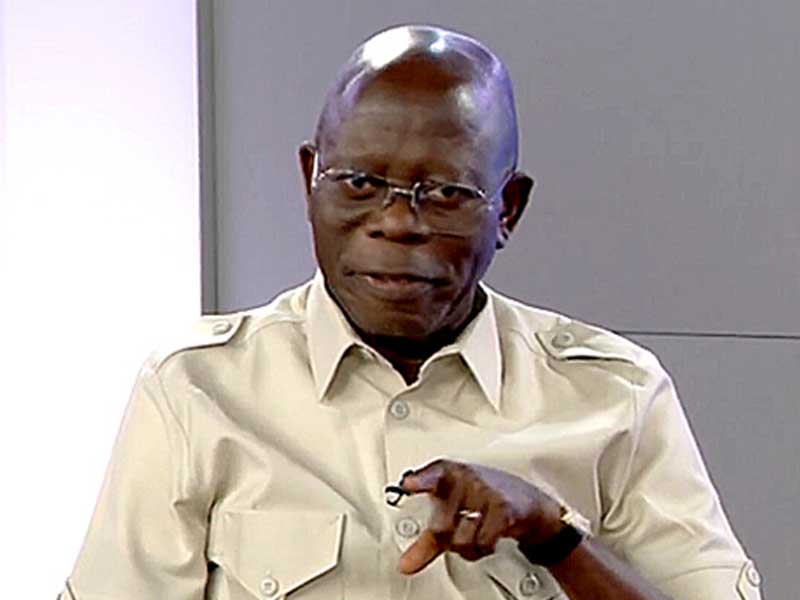News
Nigerian workers poorer, FG should pay above N70,000 – Oshiomhole

The senator representing Edo North Senatorial District, Adams Oshiomhole, on Wednesday, said the current generation of workers in the country is much poorer than those in the past.
According to him, the celebrated N70,000 minimum wage, when converted to dollars, is equivalent to $42.
The former Nigeria Labour Congress president, comparing the first minimum wage in the country under President Shehu Shagari, noted that the N125 minimum wage at that time was equivalent to $160.
Oshiomhole spoke during a lecture organised for members of the Executive Intelligence Management Course 17 at the National Institute of Security Studies in Abuja.
He said, “When minimum wage in Nigeria was established under President Shagari, I think around 1981, it was around N125 which was about $160 a month.
“Today, with the fat increase, the 100 per cent increase that the labour achieved last year, which is now being implemented this month, according to our current exchange rate, is $42.
“So if you divide N70,000 by N1,650, it gives you $42. The working people are much, much poorer now than we were so many years ago. So this opportunity will depreciate, and that affects the quality of life and everything.”
Oshiomhole also said the Federal Government and other states generating high revenues should pay workers more than the agreed N70,000 minimum wage.
He recalled how he declared a strike to compel the Lagos State government under Bola Tinubu to pay above the N5,000 minimum wage during his time as the NLC president.
He said, “A serious employer of labour should not pay minimum wage. They should pay much more. A major employer, like the civil service, should not pay the minimum wage. I expect that the Federal Government will, over time, adjust their minimum wage.
“When I was NLC president, we agreed that oil-producing states like Delta, Bayelsa, Rivers, Akwa-Ibom, Lagos and those who have a huge revenue should pay not less than N7,000 minimum wages, the same as the federal.
“Interestingly, when we pursued this policy, the president was the governor of Lagos State. He showed me all the books and told me he could not afford to pay. I had to compel him.
“We organised strikes against this president, asking that he should use all the money necessary to pay salary, even if he can’t do any other thing.
“That’s my business. My brief was not to go and sympathise with the employers. My brief is to get them to squeeze out anything we can squeeze out.”
Oshiomole also called for the expansion of minimum wage law to domestic staff, among others, through the amendment of the law.
He said, “But again, if you look at the law in Nigeria, which I hope will be able to amend very soon, although the Federal Government and the states have agreed on a minimum wage, for example, at N70,000, there are still people who are paying less than that, even under the law, because it says you have to have about 25 to 50 employees minimum for that law to be applicable to a particular enterprise.
“But with the changing technology, a small ICT company employing 10 people can generate so much turnover. So, using the number of employees was appropriate when the economy was more broad-driven, not with ICT.”
He also explained that the wages in other countries, especially in California in the United States, could be fuelling the Japa syndrome experienced in the country.
According to him, an unskilled worker could earn as high as $2,560 in a month in California.
He said, “If you check with Google, you’ll find that California minimum wage as of today is $16 an hour.
“So if a worker works for eight hours a day as we do in Nigeria, eight hours will give you $128 a day. In a month, if you work for five days a week, for four weeks, you work for 20 days, you earn $2,560 in a month.
“That is the minimum wage for unskilled labour. How much does that translate to in a month if you convert by exchange rate?”
Expressing hope that the country would prosper despite the hardships faced by citizens, he urged the government to watch some of its policies.
He said, “Today, I mean, we are going through a challenging period, but as we say, tough times don’t last, tough people do. Nigerians are tough. This time will pass, and prosperity will be here again.
“We just need to watch our policy choices so that the gains of the past are not lost.”
News
Just in: Shettima jets out to attend Senegal’s independence

Vice President Kashim Shettima has departed Abuja for Dakar, Senegal for official assignment.
The VP is expected to represent President Bola Ahmed Tinubu at the West African nation’s 65th Independence Anniversary celebrations.
Senegal marks its Independence Day on April 4 each year, commemorating its liberation from French colonial rule in 1960.
The annual celebration is a significant event featuring national parades, cultural displays, and ceremonies highlighting the country’s achievements and unity.
A statement issued on Thursday by Senior Special Assistant to the President on Media and Communications, Office of the Vice President, Stanley Nkwocha, said Shettima’s participation followed an official invitation from Senegalese President, Bassirou Diomaye Faye.
This underscored the strong diplomatic and economic ties between Nigeria and Senegal.
The two nations share longstanding relations, particularly within the Economic Community of West African States (ECOWAS), fostering cooperation on regional security, trade, and development initiatives.
The event is expected to reaffirm Senegal’s commitment to democratic governance and regional cooperation.
Vice President Shettima is scheduled to return to Nigeria immediately after the one-day celebrations, continuing his engagements in national development and diplomatic outreach.
News
Just in: “Ignore rumour mongers, there was no time I collapsed “-Wike asserts

Federal Capital Territory FCT minister, Nyesom Wike on Thursday dismissed social media reports that he collapsed last week, describing the reports as the handiwork of rumour mongers trying to score cheap political points.
Wike spoke after he inspected four ongoing projects in the territory, including the International Conference Centre ICC.
News
CJ transfers Natasha’s case to Justice Nyako

The Chief Judge of the Federal High Court, Justice John Tsoho, has reassigned the suit filed by Senator Natasha Akpoti-Uduaghan against Senate President Godswill Akpabio and others to Justice Binta Nyako.
The case, which was initially handled by Justice Obiora Egwuatu, will now be heard afresh by Justice Nyako following Egwuatu’s withdrawal from the matter. His decision came after allegations of bias were reportedly raised by Akpabio, the third defendant in the suit.
Justice Egwuatu withdrew from the case on March 25, citing concerns over judicial integrity.
“Justice is rooted in confidence in the court. Once a litigant expresses his belief that there is bias or likelihood of bias on the part of the judge, it will not be in the interest of justice for the judge to continue,” he stated.
He forwarded the case file to the Chief Judge for reassignment.
Senator Akpoti-Uduaghan, who represents Kogi Central Senatorial District, had filed the lawsuit to halt an investigation into her alleged misconduct by the Senate Committee on Ethics, Privileges, and Public Petitions. She had sought an interim injunction to prevent the committee from proceeding with disciplinary actions against her.
Justice Egwuatu previously issued an order on March 4 declaring Akpoti-Uduaghan’s suspension by the Senate null and void. However, on March 19, he set aside a portion of his ruling after hearing arguments from both sides. The Senate had filed a motion urging the court to vacate the order, arguing that it interfered with its legislative duties and could lead to a constitutional crisis.
During legal proceedings, the Senate’s lawyer, Chikaosolu Ojukwu, argued that the court’s order restrained the Senate from fulfilling its constitutional responsibilities, while Akpoti-Uduaghan’s counsel, Michael Numa, opposed the motion, describing it as a disregard for the court’s authority. He urged the court to dismiss the Senate’s application and take disciplinary action against the defendants for contempt.
Akpoti-Uduaghan also filed a contempt charge, asserting that her suspension was a deliberate violation of the court’s interim injunction. She maintained that the court’s directive was duly served on the defendants, but they proceeded with actions in defiance of the ruling.
Nigeria’s 1999 Constitution (as amended) grants the National Assembly the authority to manage its internal affairs, including disciplining its members. However, this power is not unlimited. It must be exercised in accordance with constitutional provisions, due process, and the rule of law.
The principle of separation of powers, outlined in Section 4 for the legislature, Section 6 for the judiciary, and Section 5 for the executive, ensures that each arm of government functions independently without interference. However, courts have the authority to review legislative actions if they infringe on fundamental rights or violate existing laws.
Judicial rulings have established that while legislatures hold disciplinary authority, their actions must align with the principles of natural justice, particularly the right to a fair hearing, as outlined in Section 36 of the Constitution. The outcome of this case could clarify the extent of legislative immunity and determine whether courts can override Senate disciplinary actions when due process is at stake.
-

 News8 hours ago
News8 hours agoNatasha: Kogi PDP hammers Ododo, reiterates unfeigned support for her
-

 Economy7 hours ago
Economy7 hours agoSEE Black Market Dollar To Naira Exchange Rate Today 3rd April 2025
-

 News14 hours ago
News14 hours agoRivers APC demands Fubara’s probe over ex-HoS allegations
-

 News2 hours ago
News2 hours agoJust in: “Ignore rumour mongers, there was no time I collapsed “-Wike asserts
-

 News6 hours ago
News6 hours agoJust in: INEC dumps recall petition against Sen Natasha
-

 News2 hours ago
News2 hours agoCJ transfers Natasha’s case to Justice Nyako
-

 Economy15 hours ago
Economy15 hours agoNaira rebounces against the dollar in parallel market
-

 News7 hours ago
News7 hours agoUS cancels ex- president ,Nobel Peace Prize winner Oscar Arias visa




